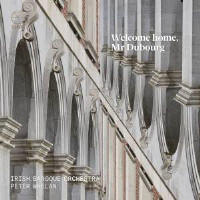Texte paru dans: / Appeared in: |
|
|
Reviewer: Bertil
van Boer As I received this disc, entitled Welcome home, Mr. Dubourg, I was reminded of one of the opening sequences in the first file of J. K. Rowling’s Harry Potter series, in which a befuddled child is greeted by a group of mages in a tavern with a “Welcome home.” Before one gets too far down this road, however, the analogy is not so far off, as the notes begin with a comment by Irish author Benjamin Victor on the playing of violinist Matthew Dubourg (1703–1767), the last line of which reads “play tricks – and fix ‘em – fools again!” Here one can ascertain that a certain bundle of magical musical tricks was at hand. Dubourg is hardly a footnote in music history, but during his lifetime he was well known for his virtuoso performances, as well as his promotion of Irish and Scottish songs. Though of extremely obscure origins, he was able to study with Francesco Geminiani, and by 1714 began a career as a violin soloist. He was apparently quite a showman, known for his aggressive and facile style of playing, and within a few years he was performing concertos by the leading international stars such as Vivaldi, but also began writing some for himself. He adapted the sonatas by Corelli, too, and in the middle of all of his concertizing, he was lured back to Ireland by Lord Perceval as the concertmaster of the orchestra in Dublin. Here he became interested in the folk traditions, adapting and arranging folk songs, as well as commuting back and forth between Dublin and London for various official engagements. These included composing odes for various officials, and by the 1740s even Handel was impressed enough to give him a bequest in his will. Now, about that “welcome home”: It was Handel who allegedly coined the phrase when Dubourg’s improvisations led him to modulate so far afield harmonically that when he finally reached the appropriate cadential trill, the audience and the composer were relieved that he ended up in the same key with which he began.
Dubourg was an active and diligent composer, though relatively little of his music has survived. Of the many concertos, there appears to be only one, and given that the source is in the Saxon State Library in Dresden, one wonders if someone like Johann Pisendel might have imported it. This work is in the typical four movements, beginning with a French-style opening, replete with dotted rhythms like a solemn overture. The Allegro that follows is more conventional and yet a bit modern, with some swirling solo lines that feature more virtuosity than melodic content. The finale is a rather rollicking gigue that trips right along. Dubourg’s Maggot is a light and airy folk song rendition, while the set of variations on the Irish song Eileen Aroon is sprightly in just the sort of manner that would please amateur players—not too difficult but tuneful. The Corelli sonata arrangement (op. 5/9) features Dubourg’s ornamentation, which is tasteful and discrete, leaving the original intact but not obscured. The second movement gigue, for example, leaps along with little twists and turns. Of course, the final movement is the “Welcome home,” that is surprisingly stately, with Sophie Gent’s improvisations flitting about just as Dubourg must have done, winding up correctly (and with a spectral voice intoning the phrase at the right juncture). If this improvization is any indication, he must have been a talented player indeed.
The centerpiece of this disc, however, is the complete Dublin Ode of 1739, very much written in the Handelian vein. It is apparently the only complete work of this type that survives, but it shows Dubourg’s debt to Handel, as well as his acknowledgment of the emerging Classical style. The opening chorus, for instance, is quite lyrical but homophonic, and though Handel may be lurking in the background, it seems more like the “new” Telemann. The aria “From hour to hour” is a bit more old-fashioned, with a pastoral lilt, and suddenly a second section emerges with a more virtuoso melody and faster tempo. The aria “Born to glory” has a rather challenging solo cello part that plays well against a soprano line that floats lyrically above the solo. The duet that follows (“Pleased with our state”) is a soft and quite happy minuet, a foil for the final chorus. The remaining bits and pieces from the other odes demonstrate a facility that mingles pomp and power. For example, the opening chorus from the 1753 ode has trumpets that support the message of “Hibernia’s sons” as loyal subjects to the crown, while the “melting flute” of the 1743 ode has a soft and enchanting duet for flutes against which the soprano line weaves in and out of the harmony.
The
performance by the Irish Baroque Orchestra is tasteful and light. Simon
Munday’s trumpet adds a touch of majesty, and the solo cello playing of
Sarah McMahon is quite facile. Soprano Anna Devin has the proper lighter
voice for this style of music, and the bass voice of Edward Grint is rousing
and forceful, quite Handelian in temperament. All in all, this is a fine
disc and one that not only shows Dubourg as a competent and insightful
composer, but presents music that ought to be known more. This one will make
my Want List for this year. | |
|
|
|
|
|
|
|
Cliquez l'un ou l'autre
bouton pour découvrir bien d'autres critiques de CD |
|




